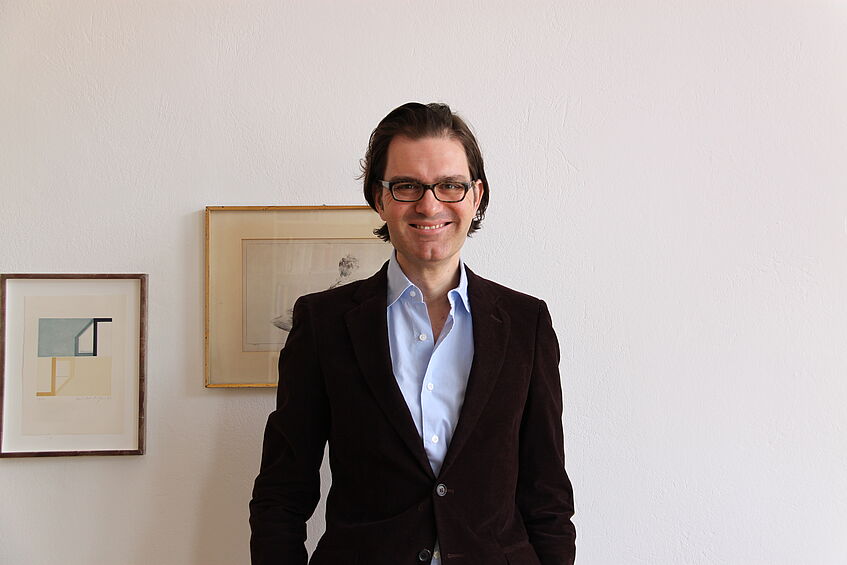
© Katharina Wiedemann
Univ.-Prof. Dr. iur. Miloš Vec
Professor of European Legal History at the University of Vienna; Permanent Fellow at the IWM, Vienna
Miloš Vec is Professor of European Legal and Constitutional History at Vienna University and a Permanent Fellow at the IWM (Institut für die Wissenschaften vom Menschen), Vienna. He received his Habilitation in Legal History, Philosophy of Law, Theory of Law and Civil Law in 2005 from Goethe University Frankfurt am Main. Until 2012 he worked at the Max-Planck-Institute for European Legal History in Frankfurt and taught at the Law Faculty there. He has also taught at the Universities of Bonn, Hamburg, Konstanz, Lyon, Tübingen and Vilnius. His awards include: German National Academic Foundation (Studienstiftung des Deutschen Volkes), 1989–1991; Otto Hahn Medal of Max-Planck-Society, 1997; Appointment as founding member of The Young Academy at the Berlin-Brandenburg Academy of Sciences and Humanities and the German Academy of Natural Scientists Leopoldina, 2000, Walter Kalkhof-Rose Memorial Award of the Academy of Sciences and Literature, Mainz, 2006; Academy Award of the Berlin-Brandenburg Academy of Sciences and Humanities, 2008; Fellow to the Wissenschaftskolleg (Institute for Advanced Study, WiKo), Berlin, in the academic year 2011/2012; UNIVIE Teaching Award 2015 of Vienna University. Senior Global Hauser Fellow at the New York University 2017. Miloš Vec has been an associate member of the Cluster of Excellence ‘The Formation of Normative Orders’ at Frankfurt University since 2013. His main research interests are the history of international law and multinormativity. Since 1989, Miloš Vec has also contributed to various publications as a free-lance journalist, particularly for the Frankfurter Allgemeine Zeitung.
Homepage: http://rechtsgeschichte.univie.ac.at/mitarbeiterinnen/milos-vec and: http://www.iwm.at/the-institute/permanent-fellows/milos-vec
Abstract
The Rule of Law after 1918 between Internationalism and Nationalism
The rule of law was shaken to the core during World War I; this left a deep memory of disappointment to all of those who believed in this legal principle. Political interest and military needs turned out to be by far more important than restrictions through statutory and particularly constitutional law. This attitude did not only affect the domestic sphere but also international relations. International law faced a hostile climate of ferocious militarism, nationalism, and extreme violence. The doctrine of “extreme military necessity” gave the blank cheque to disobey international treaties and long-standing customary law and lawyers became miserable comforters in the interest of the state.
But how about the years after 1918 and the interwar period? My talk aims at combining observations from both the domestic and the international sphere to tell a cultural history of mentalities towards the trust in the rule of law. How did contemporaries perceive bindings through legal norms? Did the experience of disappointment lead to a disbelief in legal forms or was more law the answer to the original catastrophe of the 20th century?
In my analysis of the intellectual history of international law, two different poles can be identified at that time. First, the changing collective mentality: the years around 1900 promised a shining future for international law which never came. Instead, they had to discuss after 1914 the legality of terrifying new technologies on the battlefields and justify breaches of legal obligations. Second, the reinforcement of the “invisible college of international lawyers”: Mutual trust in a shared normative framework also shaped the collective behavior after 1918. What can tell us the attitudes of the international lawyers on both sides about the rule of law and its (de-)politicisation?
Programme: Panel 2, Wednesday, 5 September 2018, 14:30-16:00
Programme: Chair Panel 8, Thursday, 6 September 2018, 17:30-19:00